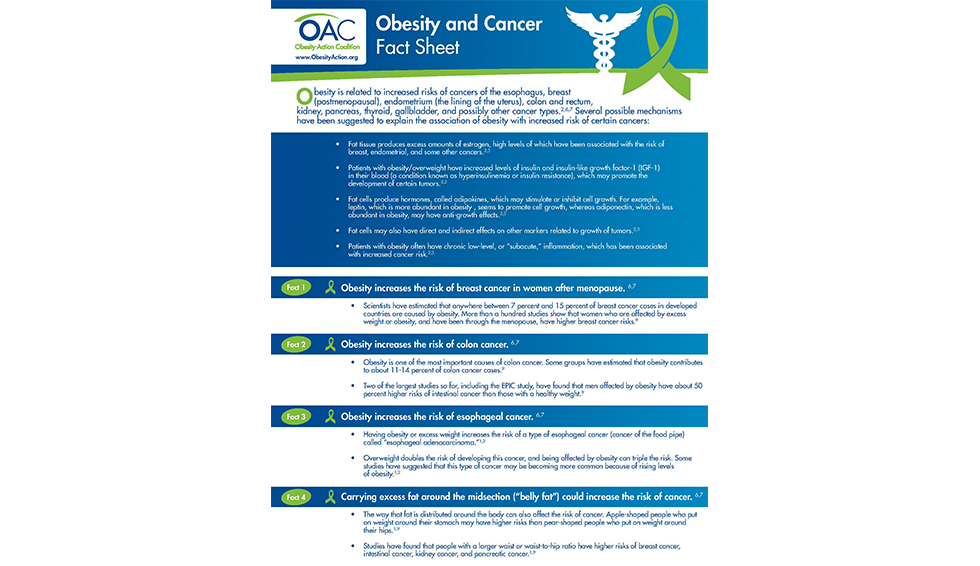Obesity and Cancer Fact Sheet

Obesity is related to increased risks of cancers of the esophagus, breast (postmenopausal), endometrium (the lining of the uterus), colon and rectum, kidney, pancreas, thyroid, gallbladder, and possibly other cancer types.2,6,7 Several possible mechanisms have been suggested to explain the association of obesity with increased risk of certain cancers:
- Fat tissue produces excess amounts of estrogen, high levels of which have been associated with the risk of breast, endometrial, and some other cancers.
- Patients with obesity/overweight have increased levels of insulin and insulin-like growth factor-1 (IGF-1) in their blood (a condition known as hyperinsulinemia or insulin resistance), which may promote the development of certain tumors.
- Fat cells produce hormones, called adipokines, which may stimulate or inhibit cell growth. For example, leptin, which is more abundant in obesity , seems to promote cell growth, whereas adiponectin, which is less abundant in obesity, may have anti-growth effects.
- Fat cells may also have direct and indirect effects on other markers related to growth of tumors.
- Patients with obesity often have chronic low-level, or “subacute,” inflammation, which has been associated with increased cancer risk.
Obesity increases the risk of breast cancer in women after menopause.
Scientists have estimated that anywhere between 7 percent and 15 percent of breast cancer cases in developed countries are caused by obesity. More than a hundred studies show that women who are affected by excess weight or obesity, and have been through the menopause, have higher breast cancer risks.
Obesity increases the risk of colon cancer.
- Obesity is one of the most important causes of colon cancer. Some groups have estimated that obesity contributes to about 11-14 percent of colon cancer cases.
- Two of the largest studies so far, including the EPIC study, have found that men affected by obesity have about 50 percent higher risks of intestinal cancer than those with a healthy weight.
Obesity increases the risk of esophageal cancer.
- Having obesity or excess weight increases the risk of a type of esophageal cancer (cancer of the food pipe) called “esophageal adenocarcinoma.
- Overweight doubles the risk of developing this cancer, and being affected by obesity can triple the risk. Some studies have suggested that this type of cancer may be becoming more common because of rising levels of obesity.
Carrying excess fat around the midsection (“belly fat”) could increase the risk of cancer.
- The way that fat is distributed around the body can also affect the risk of cancer. Apple-shaped people who put on weight around their stomach may have higher risks than pear-shaped people who put on weight around their hips.
- Studies have found that people with a larger waist or waist-to-hip ratio have higher risks of breast cancer, intestinal cancer, kidney cancer, and pancreatic cancer.
Obesity could also cause cancer through other means, including:
- Increasing the risk of esophageal cancer by causing ‘gastric acid reflux’, a condition where the stomach’s acids are briefly pushed back into the throat. This damages the lining of the esophagus.
- Increasing the risk of gallstones, which in turn increase the risk of gallbladder cancer.
- Being associated with physical inactivity or high fat or highly processed diets.
- There are several ways in which excess body fat may increase cancer risk. Fat tissue produces proteins called cytokines that can cause chronic inflammation, which increases cancer risk.11 Having obesity also increases blood levels of insulin and related hormones that can spur the growth of cancer cells.
- Promoting behaviors that are generally healthy may lower individual cancer risk Source – www.cdc.gov/cancer/dcpc/prevention/midlife.htm
- Getting enough physical activity
- Getting enough sleep
Seeking appropriate medical care
- Managing chronic diseases such as diabetes
- Testing for hepatitis C virus (HCV) infection
- Getting help to quit smoking
- Screening for and managing obesity
- Screening for certain types of cancer
Reducing harmful exposures
- Avoiding excessive UV exposure
- Limiting alcohol use
- Quitting smoking and other tobacco use
- Avoiding exposure to certain chemicals
- Limiting radiation dose during medical imaging procedures
by Sarah Muntel, RD Summer 2024 Here comes summer with sunshine, relaxation and lots of fun! As…
Read Articleby Nina Crowley, PhD, RD Summer 2024 Before we talk about body composition, it’s important to know…
Read Articleby Greer Raggio, PhD, MPH Summer 2024 When we think about grief, we often imagine someone coping…
Read Article







